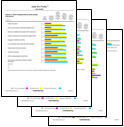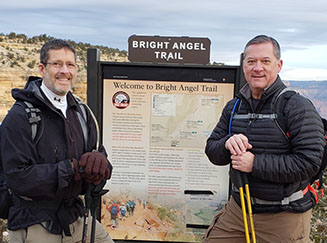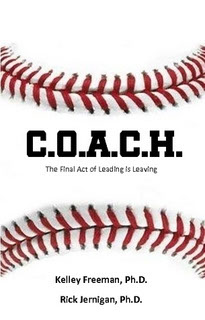Mental Game Rule #1:
People are crazy.
Mental Game Rule #2:
So are you.
What is The Mental Game?
Simply put, the Mental Game is the powerful, but often invisible, world of our thoughts: perceiving, predicting, evaluating, interpreting, rationalizing, etc.
We are all conditioned through life events to attribute our ineffective behaviors and emotions to someone or something other than ourselves.
This puts us in a difficult position, because it means that we are at the whim of events and people over which we have little or no control.
In this workshop, you will learn that you do in fact have control over how you respond.
Why does The Mental Game matter?
Your Performance = Your Ability +/- Your Mental Game
This means that The Mental Game can work FOR or AGAINST you.
People who believe they have no control over their reactions are more likely to be depressed, complacent, fearful, defeated, helpless, uncreative, and inactive.
The Mental Game of the coach affects the Mental Game of the players.
The Mental Game affects every area of our lives.
Workshop Agenda
“Physician, heal thyself”: Coaching others in The Mental Game first means coaching yourself.
Killer B Stings: What it looks like to get off your game.
The ABC’s of Killer B Stings: What causes us to get off our game?
Treating Killer B Stings: How to get back on our game.
How Killer B Stings become systemic infections: How The Mental Game affects team dynamics.
What are “anti-B-otics?”: How to stay on your game.
How to help others
Program Methodology
Knowledge is necessary but insufficient: Skill mastery is achieved through “watch it/receive it/do it” practice.
It’s not enough that the audience “gets it”—they also have to give it. Program content is organized so that participants can remember it and pass it on.
Home field advantage: We use “real plays,” not role plays. Participants use real-life situations that they can easily transition from the learning environment to their real world.
Culture change through mutual accountability: Participants make commitments, then return one month later to follow up, share successes, and master the art of getting past coaching “stuck points.”
Program Overview
 Killer Bs Profile: Assessment by self and others of Mental Game behaviors; administered prior to program and 6 months following program. Helps participants identify their personal learning goals for the program.
Killer Bs Profile: Assessment by self and others of Mental Game behaviors; administered prior to program and 6 months following program. Helps participants identify their personal learning goals for the program.
 Session A: One day. Introduce, demonstrate, and rehearse the Mental Game model and relevant tools; make specific commitments for implementation over the next 30 days.
Session A: One day. Introduce, demonstrate, and rehearse the Mental Game model and relevant tools; make specific commitments for implementation over the next 30 days.
Session B: Half day, approximately four weeks after Session A. Debrief successes and obstacles; review/rehearse Mental Game tools; extend Mental Game concepts to coaching others; make specific commitments for keeping the fire alive post workshop.
Who should attend The Mental Game?
People leaders of all levels. We’ve had C-Level executives in Fortune 500 companies, all the way down the org chart to first-time leaders in Mental Game Why? Because these principles apply to all people, in all situations, at all times.
HR Business Partners (HRBPs). These people might not have direct reports, but they are often in the position of coaching the coaches. For this reason, we recommend that HRBPs to master the Mental Game concepts and skills, to ensure that other leaders use what they learn.
Emerging Leaders. Many of our clients send emerging leaders to Mental Game prior to their promotion, so that they begin to make the transition from player to coach, and so that they hit the ground running when they take on their first team.
Individual Contributors: Like we said above, these principles apply to all people, in all situations, at all times.
What mix of people should attend the mental game together?
Intact Teams? Attending Mental Game together can be a great way for a team to rapidly shift their culture. However, we understand that for some teams it is not feasible for everyone to be away from work at the same time.
Different Departments? No problem here; in fact, we’ve had people from different companies co-attend The Mental Game. Participants tend to find the diversity refreshing. Some clients require visiting attendees to sign nondisclosure agreements.
Different Levels? We’ve had groups that mixed C-Level executives with manger-level leaders. This approach can be a powerful lead-by-example experience, provided that the senior execs can put themselves in a “learner” role, not dominate the conversation, and that the lower-level leaders do not overly defer to the higher-level executives.
Who leads the The Mental game workshop?

Kelley Freeman, Ph.D. Rick Jernigan, Ph.D
Dr. Kelley Freeman & Dr. Rick Jernigan are the co-founders of The Align Group, an organizational psychology firm devoted to helping people, teams, and organizations make a lasting positive difference in their world.
Their careers have paralleled each other for many years: both are graduates of Baylor University, both obtained their doctorate degrees in psychology from Fuller Theological Seminary, and both served in the United States Air Force prior to entering the private sector. Their work has taken them into Fortune 100 companies, international organizations, fast-growing privately held firms, and vibrant community organizations that cover a breadth of industries and levels of leadership. They coach business executives (from C-Level executives to front-line managers), facilitate organizational strategy, and create innovative programs that accelerate growth and development.
Kelley and Rick are passionate about teaching ordinary leaders how to develop extraordinary people. As co-authors of the book C.O.A.C.H. and the C.O.A.C.H.™ workshop, they have personally coached thousands of business leaders in how to develop the talent of their people and to create self-motivated, self-directed individuals and teams.



